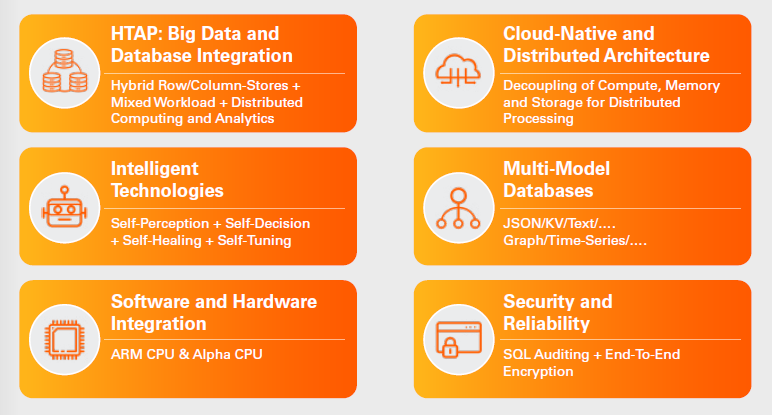
Feifei Li, Vice President of Alibaba Group, President of Database Products Business Unit, ACM Distinguished Scientist
Feifei Li is currently the Vice President of Alibaba Group, ACM Distinguished Scientist, President of the Database Products Business Unit of Alibaba Cloud Intelligence, and Director of the Database and Storage Lab of DAMO Academy. He has won multiple awards from NSF, ACM, IEEE, Visa, Google, HP, Microsoft, and IBM. He is a recipient of the ACM SoCC 2019 Best Paper Award Runner-Up, the IEEE ICDE 2014 10 Years Most Influential Paper Award, the ACM SIGMOD 2016 Best Paper Award, the ACM SIGMOD 2015 Best System Demonstration Award, and the IEEE ICDE 2004 Best Paper Award. He has been an associate editor, PC co-chairs, and a core committee member for many prestigious journals and conferences. He has led the R&D efforts of cloud-native database systems and products at Alibaba.
Gartner recognizes Alibaba Cloud as a Leader in the 2020 Magic Quadrant for Cloud Database Management Systems (DBMS). It implies that the Chinese database pioneer is at the forefront of cloud database development among the world's best.
Gartner has now combined Operational Database Management Systems (OPDBMS) and Data Management Solutions for Analytics (DMSA) into Cloud Database Management Systems (DBMS) because the global research giant believes that "There is Only One DBMS Market." The move implies that the Cloud DBMS Magic Quadrant is more competitive and has a higher value, and lays the ground for a trend that calls for databases and data warehouses integration.
As the database industry evolves rapidly, let's explore six technical trends of the nextgeneration enterprise databases.
The rise of cloud service providers was a typical feature during the past decade. The growth and success of many cloud service providers resulted from the opportunities brought by the emerging technologies of cloud computing.
The system of cloud-native technologies derived from cloud computing had given birth to cloud-native databases and cloudnative data warehouses, such as Alibaba Cloud PolarDB and Alibaba Cloud AnalyticDB.
Another dominant trend was the growth of distributed technologies, which have evolved from their rudimentary forms over the past decade, making distributed databases and data warehouses possible.

First, cloud-native and distributed technologies will be further integrated into a seamless architecture to provide better elasticity and high availability.
Second, the profound application of intelligent technologies. This involves using AI and related technologies to achieve intelligent O&M of databases, such as index recommendations, MySQL governance, and exception detection.
Third, integration of database and big data technologies, including hybrid transaction/analytical processing (HTAP) and integration of online/offline resources. In the past decade, databases and big data services were separate. Databases were all about offline processing, whereas big data supported online services. However, customers tend to use one system to manage the entire data application process, covering data generation, processing, storage, and final consumption. It's an increasingly urgent need to reduce the costs of data migration and storage. Customers hate synchronizing data every day. Integration of online and offline resources, HTAP, or online query and offline computing capabilities can help resolve all these problems in no time. This will be an essential trend in the next decade. That's why Gartner has combined the initially separated Operational Database Management Systems (OPDBMS) and Data Management Solutions for Analytics (DMSA).
Fourth, multi-model database. How to process unstructured or semi-structured data such as text and images along with structured data, is critical. Integrated multi- model databases can help to deal with unstructured or semi-structured data.
Fifth, hardware and software integration. The development of hardware, such as non-volatile memory (NVM) and high-speed networks, plays a critical role in designing database systems.
Last but not least, security and reliability. Such issues are not an emerging trend but will continue to evolve. For example, it’s crucial to figure out how to build a blockchain into a database system to make it tamper-proof or protect databases by using encryption technology.


Alibaba Cloud will continue concentrating on varied fronts, including:
In addition, the cloud pioneer will also provide managed RDS and NoSQL databases and tools. Regarding managed services, we tend to build a management platform, which combines the strong points of cloudnative and intelligent technologies to provide premium management services, such as automatic instance management and high availability.
We also want to focus on our core competencies, increase investment in key in-house services, provide a management platform, and cooperate with ecosystem partners. For example, instead of investing in the development of MongoDB, we have signed an agreement with MongoDB to use its latest version. From the development of database kernels, provision of O&M services to application development as an Internet service provider (ISV), our core business strategy has always been to leverage and increase the power of an ecosystem.
OpenAnolis - December 7, 2022
Alibaba Clouder - February 8, 2021
Alibaba Developer - September 6, 2021
Alibaba Developer - January 28, 2021
Alibaba Clouder - September 27, 2018
OpenAnolis - September 6, 2022
 Big Data Consulting for Data Technology Solution
Big Data Consulting for Data Technology Solution
Alibaba Cloud provides big data consulting services to help enterprises leverage advanced data technology.
Learn More Alibaba Mail
Alibaba Mail
Alibaba Mail is one of the only email service providers in the industry that supports public cloud services and provides fast, secure, and stable services.
Learn More Security Solution
Security Solution
Alibaba Cloud is committed to safeguarding the cloud security for every business.
Learn More Enterprise IT Governance Solution
Enterprise IT Governance Solution
Alibaba Cloud‘s Enterprise IT Governance solution helps you govern your cloud IT resources based on a unified framework.
Learn MoreMore Posts by ApsaraDB